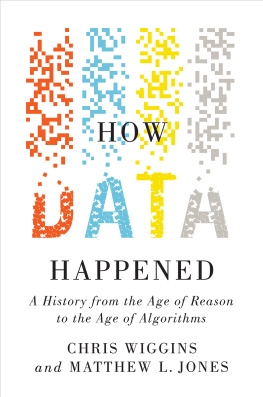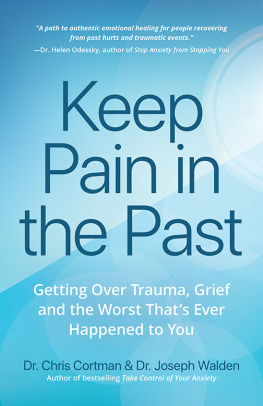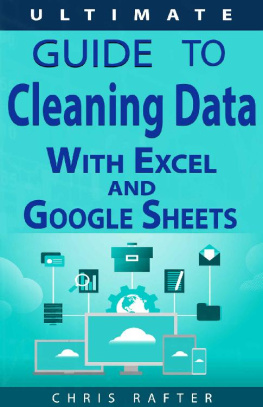Chris Wiggins - How Data Happened
Here you can read online Chris Wiggins - How Data Happened full text of the book (entire story) in english for free. Download pdf and epub, get meaning, cover and reviews about this ebook. publisher: W. W. Norton & Company, genre: Politics. Description of the work, (preface) as well as reviews are available. Best literature library LitArk.com created for fans of good reading and offers a wide selection of genres:
Romance novel
Science fiction
Adventure
Detective
Science
History
Home and family
Prose
Art
Politics
Computer
Non-fiction
Religion
Business
Children
Humor
Choose a favorite category and find really read worthwhile books. Enjoy immersion in the world of imagination, feel the emotions of the characters or learn something new for yourself, make an fascinating discovery.
- Book:How Data Happened
- Author:
- Publisher:W. W. Norton & Company
- Genre:
- Rating:5 / 5
- Favourites:Add to favourites
- Your mark:
- 100
- 1
- 2
- 3
- 4
- 5
How Data Happened: summary, description and annotation
We offer to read an annotation, description, summary or preface (depends on what the author of the book "How Data Happened" wrote himself). If you haven't found the necessary information about the book — write in the comments, we will try to find it.
How Data Happened — read online for free the complete book (whole text) full work
Below is the text of the book, divided by pages. System saving the place of the last page read, allows you to conveniently read the book "How Data Happened" online for free, without having to search again every time where you left off. Put a bookmark, and you can go to the page where you finished reading at any time.
Font size:
Interval:
Bookmark:

How Data Happened
A History from
the Age of Reason to the
Age of Algorithms
Chris Wiggins and Matthew L. Jones

W. W. NORTON & COMPANY
Celebrating a Century of Independent Publishing
To our families, who made this book possible
PROLOGUE
Kevin Roose and Cecilia Kang, Mark Zuckerberg Testifies on Facebook Before Skeptical Lawmakers, New York Times, April 11, 2018, sec. US, https://www.nytimes.com/2018/04/10/us/politics/zuckerberg-facebook-senate-hearing.html.
The weekly cadence of the class involved two separate meetings, with discussions on Tuesdays and functional engagement with the material on Thursdays: that is, computational engagement in Python performing the types of data analyses and machine learning models discussed on Tuesdays. Weve not attempted in this book to capture the applied half of the class, but we invite readers who are interested in a closer read of the material to engage directly with the data and the code provided online at the course website: https://data-ppf.github.io/.
Our language here borrows from Phillip Rogaway, The Moral Character of Cryptographic Work (2015), 1, https://web.cs.ucdavis.edu/~rogaway/papers /moral-fn.pdf.
CHAPTER 1: THE STAKES
Hanna Wallach, Big Data, Machine Learning, and the Social Sciences, Medium, December 23, 2014, https://medium.com/@hannawallach/big -data-machine-learning-and-the-social-sciences-927a8e20460d.
Wallach.
danah boyd and Kate Crawford, Critical Questions for Big Data, Information, Communication & Society 15, no. 5 (June 1, 2012): 663, https://doi .org/10.1080/1369118X.2012.678878.
Such advocacy echoes movements in the 1960s among engineers seeking more social and environmentally conscious technologies, chronicled in Matthew H. Wisnioski, Engineers for Change: Competing Visions of Technology in 1960s America (Cambridge, MA: MIT Press, 2012).
Safiya Umoja Noble, Google Search: Hyper-Visibility as a Means of Rendering Black Women and Girls Invisible, InVisible Culture, no. 19 (October 29, 2013), http://ivc.lib.rochester.edu/google-search-hyper-visibility-as-a -means-of-rendering-black-women-and-girls-invisible/. She developed the arguments in her Algorithms of Oppression: How Search Engines Reinforce Racism (New York: New York University Press, 2018).
Ruha Benjamin, Race after Technology: Abolitionist Tools for the New Jim Code (Cambridge, UK; Medford, MA: Polity Press, 2019), 4445.
Meredith Whittaker, The Steep Cost of Capture, Interactions 28, no. 6 (November 2021): 5055, https://doi.org/10.1145/3488666.
Virginia Eubanks, Public Thinker: Virginia Eubanks on Digital Surveillance and People Power, interview by Jenn Stroud Rossman, Public Books (online), July 9, 2020, https://www.publicbooks.org/public-thinker -virginia-eubanks-on-digital-surveillance-and-people-power/.
Lisa Nakamura, The Internet Is a Trash Fire. Heres How to Fix It, 2019, https://www.ted.com/talks/lisa_nakamura_the_internet_is_a_trash_fire _here_s_how_to_fix_it.
Zeynep Tufekci, Engineering the Public: Big Data, Surveillance and Computational Politics, First Monday, July 2, 2014, https://doi.org/10.5210/fm .v19i7.4901.
Renee DiResta, Mediating Consent, ribbonfarm (blog), December 17, 2019, https://www.ribbonfarm.com/2019/12/17/mediating-consent/.
Virginia Eubanks, Automating Inequality: How High-Tech Tools Profile, Police, and Punish the Poor (New York: St. Martins Press, 2017).
Brianna Posadas, How Strategic Is Chicagos Strategic Subjects List? Upturn Investigates, Medium, June 26, 2017, https://medium.com/equal -future/how-strategic-is-chicagos-strategic-subjects-list-upturn-investigates -9e5b4b235a7c.
See Martha Poon, Corporate Capitalism and the Growing Power of Big Data: Review Essay, Science, Technology, & Human Values 41, no. 6 (2016): 10881108.
Whittaker, The Steep Cost of Capture; Rodrigo Ochigame, The Invention of Ethical AI: How Big Tech Manipulates Academia to Avoid Regulation, The Intercept (blog), December 20, 2019, https://theintercept .com/2019/12/20/mit-ethical-ai-artificial-intelligence/; Thao Phan et al., Economies of Virtue: The Circulation of Ethics in Big Tech, Science as Culture, November 4, 2021, 115, https://doi.org/10.1080/09505431.2021 .1990875; Matthew Le Bui and Safiya Umoja Noble, Were Missing a Moral Framework of Justice in Artificial Intelligence, The Oxford Handbook of Ethics of AI, Markus Dirk Dubber, Frank Pasquale, Sunit Das, eds. (Oxford: Oxford University Press, 2020), https://doi.org/10.1093/oxfordhb /9780190067397.013.9.
For private ordering, see Jennifer S Fan, Employees as Regulators: The New Private Ordering in High Technology Companies, Utah Law Review, no. 5 (2019): 55.
Principles for Accountable Algorithms and a Social Impact Statement for Algorithms :: FAT ML, accessed October 1, 2018, http://www.fatml .org/resources/principles-for-accountable-algorithms.
(Cambridge, MA: MIT Press, 2018). For big data, see the pioneering Rob Kitchin, The Data Revolution: Big Data, Open Data, Data Infrastructures & Their Consequences (Los Angeles: SAGE Publications, 2014).
Melvin Kranzberg, Technology and History: Kranzbergs Laws, Technology and Culture 27, no. 3 (1986): 54748.
Enrico Coiera, The Fate of Medicine in the Time of AI, The Lancet 392, no. 10162 (December 1, 2018): 2331, https://doi.org/10.1016/S0140 -6736(18)319251.
For history as a powerful tool in teaching ethics, see R. R. Kline, Using History and Sociology to Teach Engineering Ethics, IEEE Technology and Society Magazine 20, no. 4 (2001): 1320, https://doi.org/10.1109/44 .974503.
For an excellent survey of different moments of data accumulation and analysis in the US, see Dan Bouk, The History and Political Economy of Personal Data over the Last Two Centuries in Three Acts, Osiris 32 (2017): 85106; Martha Hodes, Fractions and Fictions in the United States Census of 1890, in Haunted by Empire: Geographies of Intimacy in North American History, ed. Ann Laura Stoler (Durham, NC: Duke University Press, 2006), 24070; Simone Browne, Dark Matters: On the Surveillance of Blackness (Durham, NC: Duke University Press, 2015); Khalil Gibran Muhammad, The Condemnation of Blackness: Race, Crime, and the Making of Modern Urban America (Cambridge, MA: Harvard University Press, 2010).
Sarah E. Igo, The Averaged American: Surveys, Citizens, and the Making of a Mass Public (Cambridge, MA: Harvard University Press, 2007); Emmanuel Didier, America by the Numbers: Quantification, Democracy, and the Birth of National Statistics (Cambridge, MA: MIT Press, 2020); Daniel B. Bouk, How Our Days Became Numbered: Risk and the Rise of the Statistical Individual (London: University of Chicago Press, 2015); Emily Klancher Merchant, Building the Population Bomb (New York: Oxford University Press, 2021). More generally, see the classic studies Geoffrey C. Bowker and Susan Leigh Star, Sorting Things Out (Cambridge, MA: MIT Press, 1999) and Wendy Nelson Espeland and Michael Sauder, Rankings and Reactivity: How Public Measures Recreate Social Worlds, American Journal of Sociology 113, no. 1 (July 1, 2007): 140, https://doi.org/10.1086/517897.
Caitlin Rosenthal, Accounting for Slavery: Masters and Management (Cambridge, MA: Harvard University Press, 2018).
Theodore M. Porter, Trust in Numbers: The Pursuit of Objectivity in Science and Public Life (Princeton, NJ: Princeton University Press, 1995).
Next pageFont size:
Interval:
Bookmark:
Similar books «How Data Happened»
Look at similar books to How Data Happened. We have selected literature similar in name and meaning in the hope of providing readers with more options to find new, interesting, not yet read works.
Discussion, reviews of the book How Data Happened and just readers' own opinions. Leave your comments, write what you think about the work, its meaning or the main characters. Specify what exactly you liked and what you didn't like, and why you think so.











